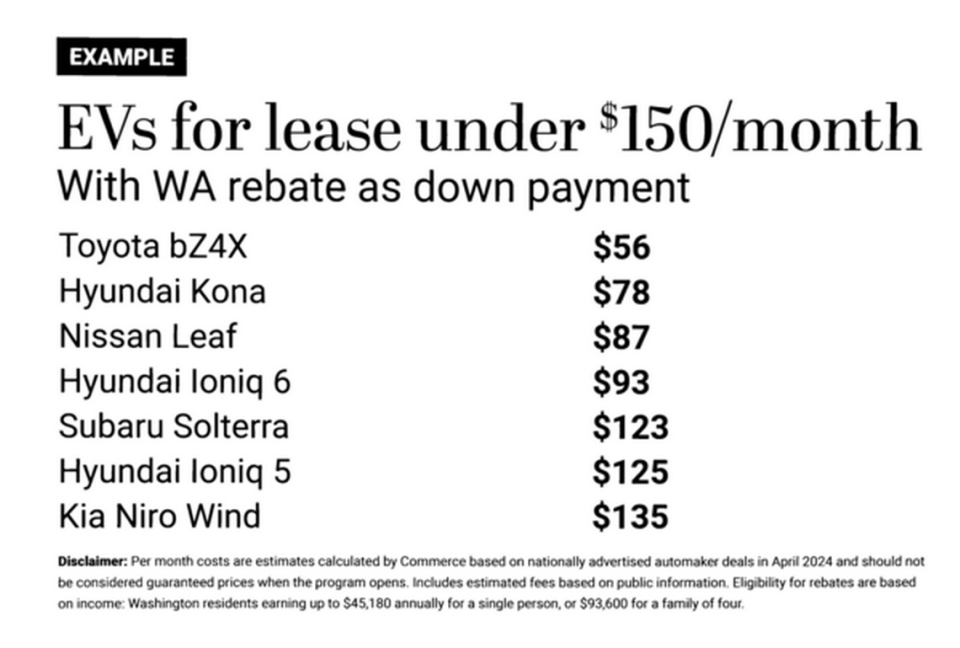New WA rebate program could get you an electric car with payments cheaper than phone bills
- Oops!Something went wrong.Please try again later.
Want a new electric car for less than the price of your monthly cell phone bill? A new Washington program could make that a reality.
Last week, the state announced an instant rebate program for low-income individuals and households looking to lease an electric vehicle. The $45 million program, which opens in August, is the first of its kind in any U.S. state, according to the Washington State Department of Commerce.
“Washington state is already a leader in EV adoption, but many more people interested in ditching the gas pump may think they can’t afford to do it,” Governor Jay Inslee said in the announcement. “With these new rebates, we’re significantly lowering the entry point, opening the door to EVs for people of modest incomes as we continue paving the way to a clean transportation future for all.”
The rebates range from up to $5,000 on two-year leases to $9,000 on leases that last three or more years. Used EVs qualify for the program too, but the rebates are capped at $2,500.
How can you qualify?
People with incomes at or below 300% of the federal poverty line are eligible for the program. That’s $45,180 for an individual and $93,600 for a family of four.
The program reimburses car dealerships for the amount of your rebate, so you don’t have to apply through the state. Instead, you just have to go to the dealership and ask about the program. If the dealer can determine that you meet the income criteria, and if your credit score is high enough to secure a lease, you’ll get your rebate up front when you sign the lease.
All fully-electric cars with a retail price under $90,000 qualify. The Department of Commerce estimates 6,500 to 8,000 rebates will be given out between the program’s start and June 2025, when the funding expires.
How much does an EV cost with a rebate?
While EV prices vary greatly depending on the model, plenty of EVs will be available for under $150 a month under the new program, according to the Department of Commerce. Based on April 2024 prices, the Department of Commerce estimated that a Toyota bZ4X would cost $56 a month with the maximum rebate. A Hyundai Konda would be $78 a month, while a Nissan Leaf and Hyundai Ioniq 6 would both cost around $90 a month. Those prices are based off of the current advertised rate of each model, and aren’t guaranteed.

EV accessibility in WA
The program is just the latest effort to increase electric vehicle accessibility across the state through the Washington Interagency Electric Vehicle Coordinating Council. The council was created through legislation in 2022 and is co-chaired by the state’s Commerce and Transportation departments.
“Transportation is the biggest contributor to greenhouse gas emissions and harmful air pollution,” stated Department of Commerce Director Mike Fong said in a press release. “It is important that people who live in our most-impacted communities, which tend to be urban and lower income, have access to cleaner transportation options, including the choice of EV ownership.”
In February 2024, the council announced more than $85 million in grants would fund close to 5,000 new charging stations in communities throughout Washington, with a focus on underserved areas.
This brought more options to all of Washington, to areas with few existing chargers and in areas with high pollution levels. There was also emphasis on publicly accessible locations, options on multifamily housing properties and stations in tribal communities.
The council released a Transportation Electrification Strategy earlier this year as well, a product of statewide surveys and collaboration with industry and contracting partners. The strategy is focused on reducing greenhouse gas emissions in Washington through the transportation sector, the state’s largest contributor.
So far, the state Department of Commerce has invested $100 million in electric vehicle infrastructure using funding from the Climate Commitment Act, according to a press release from the department.
At this point, one in five vehicles sold in the Evergreen State is electric. The council’s goal is for all passenger and light duty vehicles sold in the state to be electric by model year 2035.

